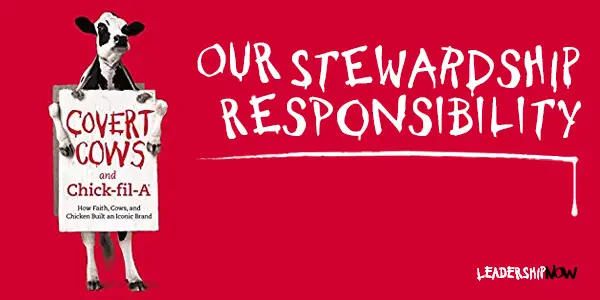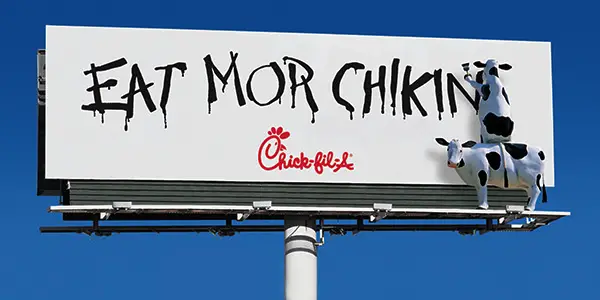 |
 |
12.04.19

Our Stewardship Responsibility
THE CHICK-FIL-A corporate purpose statement goes like this: To glorify God by being a faithful steward of all that is entrusted to us and to have a positive influence on all who come into contact with Chick-fil-A. In Covert Cows and Chick-fil-A, former executive vice-president and chief marketing officer, Steve Robinson explains that for Truett Cathy, founder of Chick-fil-A, the most important phase in the purpose statement was, “by being a faithful Steward.” And the most important word in that phrase was “by.” His premise was this business does not glorify God unless it is built upon great stewardship of the assets, talents, influence, and relationships entrusted to us. He felt accountability to his Creator—accountability for everything the Creator put into his hands and, thus, our hands—so he wanted a business that focused on doing those things well. Caught up in our day-to-day work, the idea of stewardship easily moves into the background. For Chick-fil-A, it guides everything they do. Even when drawn into controversy, regardless of personal beliefs, they act as stewards and, therefore, the need to have a positive impact on all who come into contact with Chick-fil-A. That’s the power of a clear purpose statement. “We were not a Christian business,” writes Robinson, “but rather a business where the owners and leadership aspired to apply and live out biblical principles.” Truett said that they weren’t a ministry and that he wanted “people to discover what we believe because of how we treat them.” The stewardship idea guides their marketing. Marketing is about more than transactions. It’s about relationships. When you’re building a brand based on emotional engagement rather than transactions, an investment at the personal engagement level is many times more efficient and effective than a media-weighted strategy. They contacted Horst Schulze and Danny Meyer to better understand service and hospitality. Horst told them, “Don’t look to be better than the other fast-food restaurants. Those limited expectations will just weigh you down. Instead, aspire to the next level of service—restaurants with a price point that are at least double Chick-fil-A’s, and build a service model that resembles those.” That mindset led them to create the Core 4: create eye contact, share a smile, speak with an enthusiastic voice, and stay connected to make it personal. The Cow Campaign The iconic Cow “Eat Mor Chikin” campaign developed from an idea by David Ring of The Richards Group. It is, as Robinson describes—engaging, endearing, and enduring. Stewardship comes into play here too. A former Chick-fil-A marketing consultant said, “They don’t wavier. They don’t shift. That is refreshing, and from a marketing standpoint, it can be very valuable, as you can see with the Cow campaign. They have resisted the urge to gussie it up, to change it, to get rid of it, or to do the wrong thing with it.” We also took great care ensuring the Cows never became shills for Chick-fil-A. They were in this thing for their own self-interest, not Chick-fil-A’s. If their work started to look too much like they were advertising for Chick-fil-A, such as promoting specific products and ingredients, they would quickly lose their edginess and even their believability. The cows are not on the Chick-fil-A payroll. Six Legacy Principles These six principles, based on Truett Cathy’s leadership, have guided every decision at Chick-fil-A and help to keep it uniquely different. 1. Being a Good Steward
2. Building Long-Term Relationships
3. Providing Hospitality
4. Taking Personal Responsibility
We were personally accountable to him, to the brand, and to our customers. We were accountable in the deals we created, in the relationships we built in the business, in our behavior on the road, in how we talked about the business, even in our language on the golf course. When he placed his trust in us, we responded with personal accountability. 5. Choosing Personal Influence over Position Power
6. Having Fun

* * *

Posted by Michael McKinney at 12:35 AM
|
BUILD YOUR KNOWLEDGE
 

How to Do Your Start-Up Right STRAIGHT TALK FOR START-UPS 
Grow Your Leadership Skills NEW AND UPCOMING LEADERSHIP BOOKS 
Leadership Minute BITE-SIZE CONCEPTS YOU CAN CHEW ON 
Classic Leadership Books BOOKS TO READ BEFORE YOU LEAD |